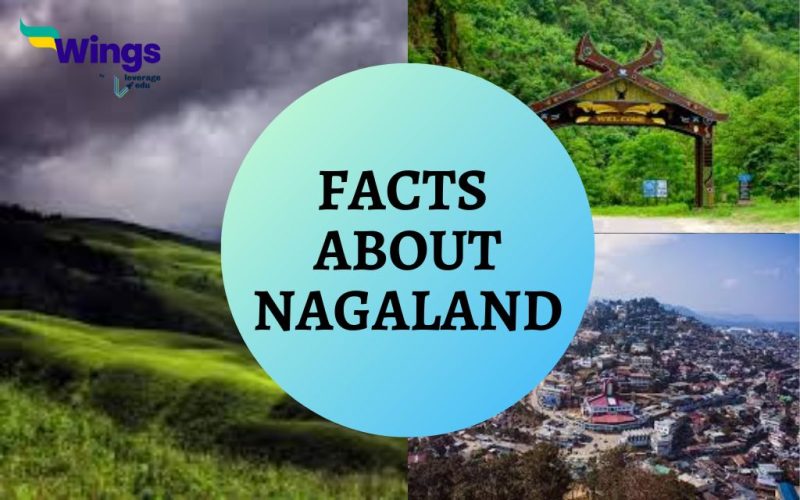Nagaland, India’s 16th state, was inaugurated on December 1st, 1963. It shares its boundaries with Assam, Myanmar, Arunachal Pradesh, and Manipur, This state is home to 17 distinct tribes, each with its own customs, language, and traditions. Rich in folklore and music, Nagaland’s cultural heritage is expressed through songs celebrating ancestors, love, and bravery. This article will discuss the top facts about Nagaland.
Table of Contents [show]
| Aspect | Details |
| Location | Northeast India, bordered by Assam, Arunachal Pradesh, Manipur, and Myanmar |
| Capital | Kohima |
| Largest City | Dimapur |
| Population | Approximately 2.2 million (2021) |
| Area | 16,579 square kilometres |
| Official Language | English |
| Major Tribes | Ao, Angami, Sumi, Lotha, Konyak, and others |
| Literacy Rate | Around 80% |
| Climate | Subtropical; Heavy monsoon rainfall from June to September |
Facts About Nagaland
Nagaland is predominantly hilly terrain with Mount Saramati as its highest peak. For all the people who love travelling, this fact about Nagaland might seem to be an already known fact. Wel! Here is more for you.
- Nagaland is a predominantly Christian state with a strong influence on its culture.
- Rich biodiversity with diverse flora and fauna. It has unique orchids, bamboo species, and red data plants. The state also shelters animals including tigers, elephants, and the state bird, Blyth’s tragopan.
- Do you know which is the largest city in the state of Nagaland? Dimapur is the largest city in the state.
- Nagaland is a dream for trekkers. The dense rainforests offer opportunities like trekking, rock climbing, and camping opportunities, while also being a treasure trove of medicinal plants.
- The Naga people, with their Indo-Mongoloid heritage, are known for their resilience and warm hospitality, having lived in harmony with nature for generations.
Historical Facts About Nagaland
There are no written records detailing the early history of Nagaland. However, medieval documents from neighbouring Assam mention the economic and social lives of the Naga ethnic groups.
- In 1826, the British started ruling over this region. By 1892, the entire Naga region except Tuensang was under British administration
- Nagaland was officially inaugurated as the 16th state of India on December 1, 1963.
- Nagaland was carved out of Assam, with its capital at Kohima.
- The Naga People’s Convention (NPC) was formed in 1957 to demand a separate Naga state. P. Shilu Ao, the first Chief Minister of Nagaland, was a prominent figure in the NPC and one of the architects of the 16-point Agreement that led to Nagaland’s statehood.
Also Read- What is the Capital City of Nagaland?
Cultural Facts About Nagaland
Nagaland is home to diverse tribes, and all of them have their unique festivals. Here are some cultural facts about Nagaland.
- Agriculture being the primary occupation, most festivals are linked to it. For instance, one of them is Tsungremmong.
- Festivals hold immense religious significance for the Nagas and are compulsory to attend. For instance, hornbill festival, Aoleng Festival, Sekrenyi Festival, Moatsii Mong, Mim Kut Festival, etc.
- The Hornbill Festival is an annual festival of Nagalad, and it was initiated in 2000. It showcases Nagaland’s rich culture.
- The Hornbill Festival aims to bring unity among tribes and promote the state’s heritage.
Population Facts About Nagaland
The population of this Indian state is 19,78,502 persons in an area of 16,579 square kilometres.
- Nagaland is home to 17 distinct tribes and sub-tribes, each with unique and vibrant traditional attire.
- Naga costumes, jewellery, and beads are intricately designed and colourful defining the difference in the tribe’s composition.
- The younger generation is creatively blending traditional motifs with modern fashion.
- The biggest village in Nagaland is Kohima and you would be surprised to know that the official language of the state is English.
FAQ
These are the 17 tribes of Nagaland- Angami, Ao, Chakhesang, Chang, Konyak, Khiamniungan, Kachari, Kuki, Lotha, Phom, Pochury, Rengma, Sumi, Sangtam, Tikhir, Yimkhiung, Zeliang.
Nagaland is a vibrant umbrella of diverse tribes, each with its own unique culture and traditions. The way people gather and celebrate mostly all the festivals throughout the year adds to the charm of Nagaland.
Before becoming a state, Nagaland was known as the Naga Hills. It was a centrally administered territory under the Assam Governor’s administration.
Find Relevant Reads Here!
| Facts About Assam | Facts About Meghalaya |
| Facts About Arunachal Pradesh | Facts About West Bengal |
| Facts About Manipur | Facts about Bangladesh |
Now we come to the end of the facts about Nagaland. If you want to know more about topics like this, then visit our general knowledge page! Alternatively, you can also read our blog on general knowledge for competitive exams!
 One app for all your study abroad needs
One app for all your study abroad needs















 45,000+ students trusted us with their dreams. Take the first step today!
45,000+ students trusted us with their dreams. Take the first step today!
